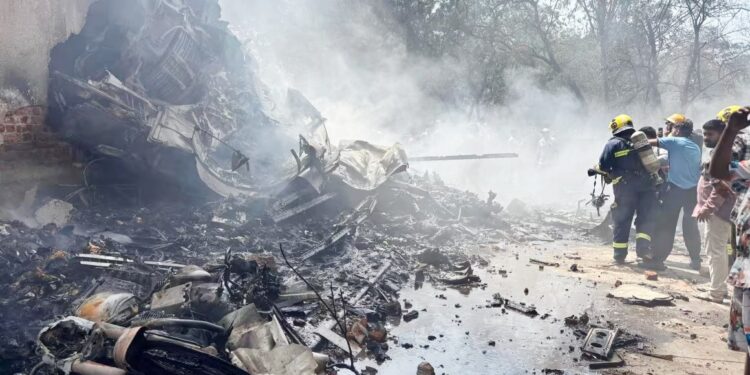A tragic aviation disaster unfolded on Wednesday when Air India Flight AI171 crashed shortly after take-off from Ahmedabad, killing at least 30 people and leaving scores injured. The Boeing 787-8 Dreamliner, en route to London Gatwick, was carrying 242 individuals, including a diverse international passenger list: 169 Indian nationals, 53 Britons, seven Portuguese citizens, and one Canadian.
The aircraft departed from Sardar Vallabhbhai Patel International Airport at approximately 13:38 IST. Within minutes, the flight issued a mayday distress signal and lost contact with air traffic control at a reported altitude of just over 600 feet. Witnesses reported seeing the plane strike a residential building in the densely populated Meghani Nagar area, triggering a massive explosion and a thick plume of smoke visible for miles.
Emergency response teams, including over seven fire engines, ambulances, and units from India’s National Disaster Response Force, arrived at the crash site swiftly. Rescue operations were complicated by the dense urban setting, with some of the casualties believed to be local residents in addition to those onboard the aircraft.
The confirmed fatalities include both passengers and crew members. Dozens more have been taken to local hospitals, some in critical condition. The final death toll may rise as rescue efforts continue and authorities work through the wreckage.
The flight was commanded by Captain Sumeet Sabharwal, a veteran with over 8,000 flight hours, and First Officer Clive Kundar, who had logged just over 1,000 hours. The aircraft itself was eleven years old, well within standard service life for long-haul jets.
This marks the first fatal crash involving a Boeing 787 Dreamliner since the model entered service in 2011, and the most serious incident for Air India since the Kanishka bombing in 1985. The crash has renewed scrutiny of aviation safety standards and raised questions about potential mechanical or procedural failures.
Indian Prime Minister Narendra Modi and UK Prime Minister Keir Starmer both expressed deep condolences. Foreign Secretary David Lammy confirmed that British consular officials were coordinating with Indian authorities and assisting the families of the affected. Portugal and Canada have also issued statements of support and sorrow.
Air India has activated emergency protocols and is working with both domestic and international agencies to provide support to families and investigate the cause of the crash. Boeing, the aircraft’s manufacturer, said it is in contact with Indian aviation regulators and will assist fully in the investigation.
The Directorate General of Civil Aviation (DGCA) has launched a formal inquiry, and the aircraft’s black boxes—its flight data recorder and cockpit voice recorder—have been recovered. Preliminary findings are expected within days, although a full report may take months.
Global airline stocks fell in early trading, with Boeing’s share price dropping more than 7% amid fears of reputational fallout and renewed safety scrutiny.
This disaster has left deep scars across four nations, devastating families and communities. As investigators sift through the evidence, the international aviation community awaits answers—and a path forward to ensure such a tragedy never happens again.
newshub finance



Recent Comments